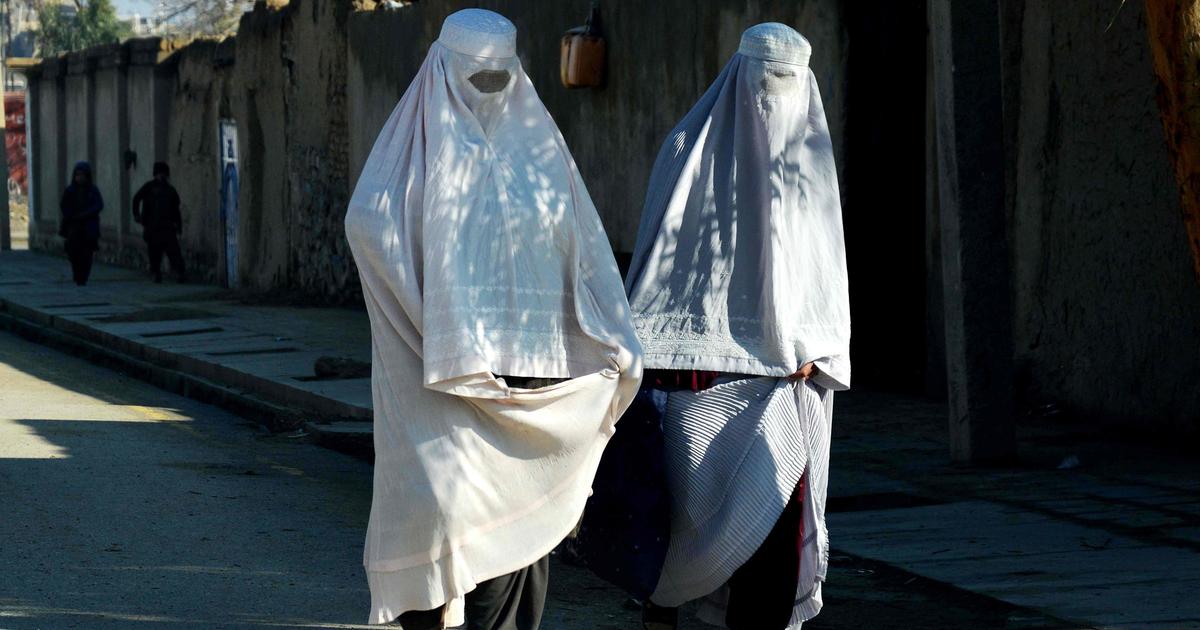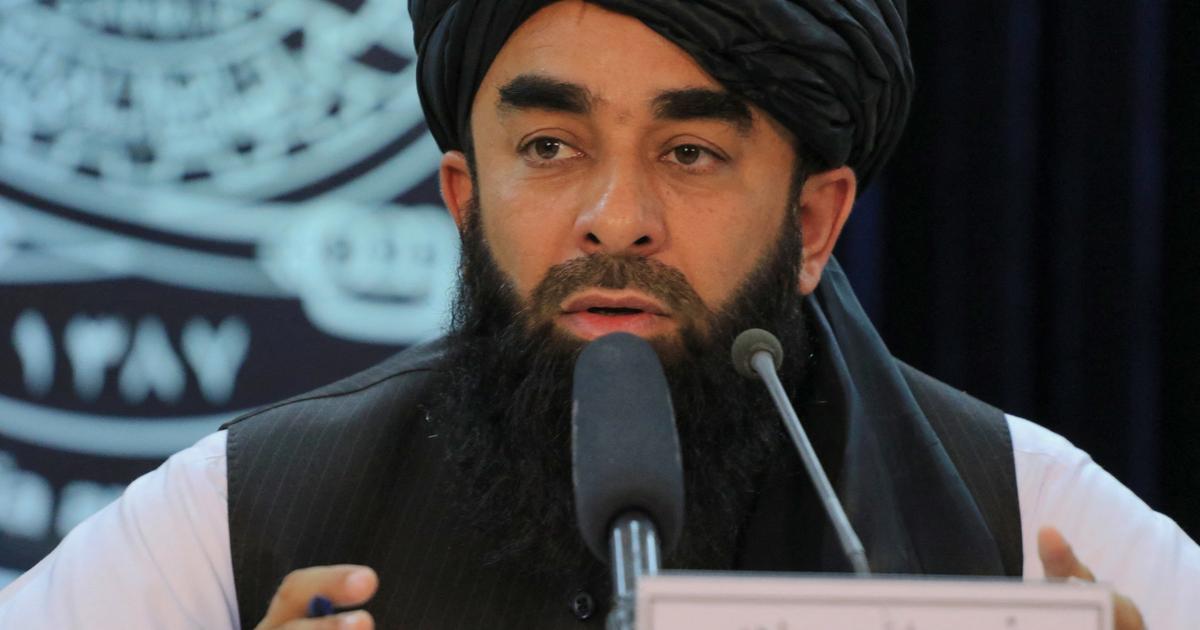On August 15, 2021, Kabul's government center imploded within a matter of hours – faster than the Western intelligence services and even the Taliban themselves had expected.
The scenes of tens of thousands of desperate people at the airport, the last area under the control of the United States, reflected the fears of many Afghans, especially Afghan women.
For years the Taliban had waged a murderous war against the Afghan state and its foreign supporters.
Sometimes written on small pieces of paper, other times printed on standard-sized sheets with a seal of the "Emirates," they would threaten all those with death who didn't stop working for the infidels.
New fear mingled among the people with deeply embedded memories of the radicals' last government, almost 20 years ago.
Back then, the Taliban had massacred their military opponents and entire neighborhoods of the Hazara, a predominantly Shiite minority.
They had banned music and television, chased women out of professions and schools.
There was fear that they would take a conqueror's revenge—but also fear of their conquest failing.
Based on precedent, that would mean a new civil war, and the choice between two catastrophes.
What has become of the country, one year later?
It would be easy to combine all the evidence of Taliban repression to paint a picture of horror.
But that would be too easy, because the situation is more complicated than the common assumptions of Afghanistan's demise.
Although the Taliban announced an amnesty for all members of the previous regime two days after their victory, there have been and still are murders, citizens are being kidnapped by the "Ishtikhbarat," the new rulers' secret service, and some disappear without a trace .
But it has only rarely affected those who were of greatest concern to foreign countries last summer: the local Afghan workers helping out international troops and organizations.
Unfortunately, one of those few affected was Wafi Walim, who spent years working for the German Agency for International Cooperation (GIZ), the Free University in Berlin and DER SPIEGEL.
He had been the focus of threats from the Taliban years earlier, and in early September 2021, right in the middle of Kabul, gunmen stopped his car and shot him several times.
Walim survived with a shattered thigh and spent two months in hospital until he was able to leave for Germany with the help of the German Foreign Ministry.
The Focus of Persecution
Still, the hatred of those who assisted the enemy hath seemed to wane with the disappearance of that enemy.
Those who have instead been the focus of persecution include members of the army, special units, police and intelligence services.
In a report released in November 2021, the organization Human Rights Watch looked into 47 such cases of "executions and enforced disappearances."
The UN mission UNAMA counted 160 murders of former security personnel up to June 2022.
It is difficult to investigate such cases, and it is possible that the true number is higher.
But their existence, along with kidnappings and cases of torture, have also been confirmed by DER SPIEGEL reporting.
Since last September, for example, there have been no signs of life from three kidnapped members of the intelligence service NDS.
A fourth kidnapping victim, who was released after just a few days due to his familial contacts to a former warlord and Taliban ally, told me of "a small, windowless solitary cell in which meat hooks hung from the ceiling. I was certain I would the there."
A police officer who had fled from Jalalabad found refuge in the home of a shared acquaintance, where I met him - a large yet distressed man, his lower legs burned by acid.
He says the Taliban called him several weeks after taking over power and told him to return to his office, which he did.
He says he was immediately tied up, beaten and forced to stand in a vat of diluted acid.
He no longer knows for how long, but his seared skin bears witness to the torture.
They then let him go, he says.
A Wave of Vengeance?
Such cases are horrific and each one is one too many, yet the Taliban government hasn't hauled even a single suspect into court, despite claims to the contrary.
At least no such court proceedings have been publicized.
Nevertheless, it can hardly be called a wave of vengeance following 20 years of war.
The greatest nightmare for the almost 40 million people in the country, though, is a different one: It's not revenge and murder that are driving the Afghans into desperation, but the state's financial collapse.
Prior to the Taliban takeover, three-quarters of state spending came from abroad, with much of it disappearing due to corruption.
What the Taliban took over a year ago was essentially an illusion of a state propped up by billions of foreign dollars – a state that collapsed as soon as the money from abroad ceased flowing.
The army, the police and pretty much the entire armada of civil servants - save for healthcare workers and teachers, which have been funded at times by the Red Cross and the UN - have gone for an entire year without receiving salaries.
Shops, businesses and restaurants have gone broke.
The Taliban may have fought the government in the belief that it was merely a servant to the infidels, but the Islamists also thought that these infidels would continue funding the country.
At least they failed to come up with a plan for replacing the predictable cessation of Western payments.
Only months after their victory did they hectically begin levying higher and higher taxes on coal mining, gold mining, market stands, the export of almonds and pomegranates, and even on parking in Kabul.
None of which changed the fact that the Afghan state is essentially bankrupt.
If the UN's World Food Program hadn't spent great effort since last autumn to expand its Afghanistan program, famine would almost certainly have been the result.
Until the Taliban takeover, the WFP was feeding a million Afghans per month.
Last winter, it was almost 18 million, nearly half of the country's population.
And that was even before the Russian invasion of Ukraine, prior to the global rise in grain prices.
The only bright spot for the country's farmers is that the feared second year of drought never materialized.
Instead, it rained almost everywhere in the country into July, so torrentially at times that numerous people lost their lives in flooding.
The Taliban doesn't even have enough money to pay their own people, which has led to a situation that some fighters at roadblocks audibly complain about their commanders, saying they drive around in large offroad vehicles and eat at restaurants.
In early June, a Talib asked us if we could perhaps help him out with a donation for his upcoming wedding.
Still, the incredible loyalty of the Taliban foot soldiers has yet to appreciably erode after spending years committed to a jihad against an amoral, corrupt government propped up by the Americans.
Eager acceptance of Western money and the attached conditions would likely be seen as a betrayal of Islam.
The terrorist movement Islamic State, which is extremely active in the country, has already begun accusing the Taliban of abandoning its holy principles.
"Deeply Disturbing"
To pacify the hardliners within its ranks, the Taliban leadership in late March made what was likely the most momentous decision of its brief rule: On the day the new school year began, they broke their promise to keep secondary schools open for girls.
"They are suffocating us, step by step," said a teacher over the phone, a young woman who had participated in a women's demonstration in Kabul just last September.
"The school was my only chance to have a life outside the home."
In response, the World Bank immediately froze a planned $600-million program, and Western recognition of the "Islamic Emirates of Afghanistan" became even more unlikely.
Ten large donor nations called the decision "deeply disturbing."
The news completely overshadowed the fact that in the first months of Taliban rule, the share of girls attending school in the country had actually increased from 44 percent to 54 percent, according to a March 2022 report from the World Bank.
The rise was not, of course, a product of the Taliban encouraging parents to send their children to school, but of the fact that for the first time in decades, the entire country is at peace and families felt comfortable sending their children out of the home.
As feared, the Taliban leadership is far away from a representative cabinet and transparent decision-making.
The government is all male, they are almost all Pashtun and clerics make up the overwhelming majority.
The Taliban is obsessed with controlling every corner of the country.
In late February, when global attention suddenly shifted to Ukraine, an estimated 30,000 fighters spent weeks combing through Kabul, street by street.
"It was frequently the case that Kalashnikovs, ammunition and hand grenades were found in the cemeteries each morning," says a resident, recalling these weeks of fear.
Many who had kept banned weapons in their home as an insurance policy against what the future might bring sought to get rid of the contraband at night, frequently depositing them in the only open space available – the cemetery.
The Taliban ultimately didn't have to search through every home.
The threat proved sufficient.
A fact missed by many observers who only traveled to Kabul: The new calm across the country has an inherent value.
Farmers are able to bring their harvests into the city, children can go to school and the sick can make their way to the hospital without having to fear for their lives - even if many hospitals, despite being propped up by the Red Cross, have insufficient medical supplies and even fewer personnel, with many health workers having fielded the country.
The alternative would have been a civil war, which Afghanistan experienced most intensively in the 1990s, but which has essentially been ongoing for the last four decades.
It was violence fueled by warlords who terrorized the entire population to hold onto their mini-empires, destroying Kabul in the process.
And they had no interest in peace or a functioning state, for that would have meant an end to their power and their wealth.
More on Afghanistan
Interview with Former Afghan President Hamid Karzai:"Millions of People Are Leaving the Country"A DER SPIEGEL Interview Conducted By Susanne Koelbl in Kabul
Using Afghanistan as the setting for a proxy war, as the US and Soviet Union did in the 1980s, plunged the country into a catastrophic phase of self-destruction, and made possible the rise of the Taliban.
Back in the 1990s, the Islamists won support with their promise of imposing security, law and peace against the caprice of the warlords.
Pakistan's secret service ISI continued trying to use Afghanistan as a stronghold from which to carry out its hidden fight against its archrival India, long providing support to the Taliban for its own purposes.
Today, ISI is supporting groups that are even more radical.
Aside from that, though, none of the would-be armed resistance groups are receiving international support, not even from the US That didn't change even after al-Qaeda leader Ayman al-Zawahiri was killed by a US drone in late July while standing on the balcony of a house under the control of the Taliban interior minister.
Washington's primary interest, as a government representative recently told the
New York Times
, is ensuring that Afghanistan doesn't make any headlines.
A Grim Future
Nobody should starve to death, but otherwise, there is little appetite to have much to do with the country any longer.
No country has thus far recognized the Emirates, and most embassies remain shuttered.
The situation is grim, and the country's future prospects are even darker.
A huge number of people want to leave Afghanistan, but in order to land a visa for Germany, the US or any other Western country, refugees must prove that they are in danger if they remain in the country.
The lack of a salary or a job, homelessness or even malnutrition isn't enough.
The consequence is that people are seeking to prove a purported threat to their lives any way they can.
Increasingly, asylum-seekers are producing purported death threats.
But why should the Taliban issue such threats or commission assassinations?
They are the state and they can arrest whoever they want.
Last fall in Kunduz, for example, during an interview with a Taliban commander, our conversation turned at some point to the Islamists' broken amnesty pledge.
We referred to the murders and the threats.
The commander claimed that the threats, at least, were phony in many instances.
We went back and forth until the commander said angrily: "If you don't believe me, then we'll just call!"
He had received a text message from a woman clearly asking him for a threat letter.
He called the number and switched on his phone's speaker.
A happy woman's voice could be heard, and she asked the commander to send her a death threat on letterhead with his signature.
"I can write the contents of the letter myself!"
He didn't want to fulfill her request, but she insisted: It's just a small little favor, she said, adding that he had certainly written dozens of such letters before.
Such falsifications are mixed in with cases of real persecution, and they are likely to reduce the chances of acceptance for those who really are in danger.
Some 30,000 Afghans received early approval for entry into Germany.
Following the initial fiasco of last year's evacuation, local hires were granted permission to leave the country and women's rights activists, artists and journalists were placed on a "human rights list" kept by the German Foreign Ministry, checked and then accepted as refugees.
By the end of July, almost 20,000 had been quietly evacuated from the country, most of them via Pakistan.
How Should Afghanistan Be Approached?
Now, though, problems have cropped up. More than 100 people who had already received permission and were to leave Afghanistan via Pakistan solely on the strength of their Afghan ID papers, the Tazkira, were sent back.
The Foreign Ministry in Berlin has said that the Taliban is not honoring their end of the deal.
But those involved say there isn't any agreement with the Taliban, only with the Pakistani government.
Negotiating with the Taliban, people say, would essentially be granting them legitimacy.
"Those who have a passport with a visa for their destination country may, of course, leave the country," says Hedayatullah Pakteen, deputy head of foreign relations at the Interior Ministry in Kabul.
"The legal framework of the old government continues to apply. Otherwise, it would be akin to human smuggling."
The Germans should approach the Foreign Ministry, where a solution will almost certainly be found, he continues – even as the US has issued a bounty of up to $10 million for his boss, Minster Sirajuddin Haqqani.
It is perhaps a minor detail, but it serves to highlight the larger problem: How should Afghanistan be approached?
The Taliban may not have a plan for the future, but neither does Germany nor the rest of the West.
For now, the country remains an international welfare case with a radical leadership, peaceful and with no discernible future.
The Taliban are simply being ignored – a convenient position for Western governments eager to avoid criticism.
But it is also a position that ignores the fact that the situation can quickly, and dramatically, deteriorate.






/cloudfront-eu-central-1.images.arcpublishing.com/prisa/KA3LQ5ZEAFEQXOIZXJEEVDUZUQ.jpg)








